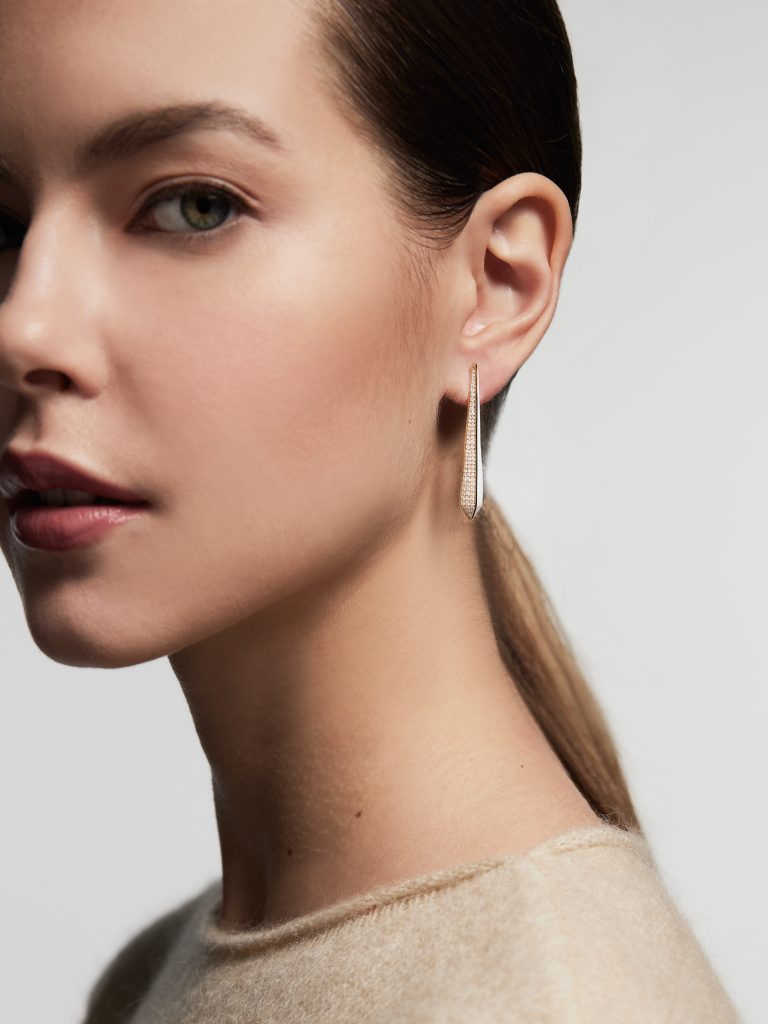
Renowned for contemporary jewellery infused with industrial design sensibilities, eight-year-old Singapore-based label State Property has made a name for itself with jewellery inspired by such conceptual ideas as emptiness, journeys and revelations, a culmination of the respective expertise of the co-founders of the homegrown jewellery brand, Ruiyin Lin and Afzal Imram, also husband and wife since 2019.
With its Arcane collection, State Property turned to a more tangible source of inspiration: Byzantine- era architectural features, such as convex domes, gold spheres and mosaics. And now, expanding on the existing collection is the newly launched Borsh series of earrings, rings and pendants, built upon a motif of graphic triangles. (Editor’s Note: At the same time, Borsh’s flourishes of black onyx and black enamel, interspersed with gold and diamonds, seem reminiscent of the ablaq decorative technique in Arabic masonry, created with alternating rows of light and dark stone or brick.)
“With Borsh, we have introduced an entirely new range of silhouettes to the State Property lineup,” says Afzal Imram. “It is State Property growing, trying new things and being a little adventurous.”
Ahead, we speak to Lin and Imram about developing State Property’s latest range, and building their brand while evolving as partners in the jewellery business and at home.

GRAZIA Singapore: What were the inspirations that went into creating the Borsh series?
Ruiyin Lin: Borsh is housed within the overarching collection Arcane, which is inspired by the Byzantine era. The triangular elements featured in the Borsh family come from the palmettes that were commonly used in Byzantine architecture. These palmettes mimic the fronds of palm leaves, which are a symbol of rest, hospitality and peace in many Middle Eastern cultures.
GRAZIA Singapore: What are the features of this series that are still distinctly State Property?
Ruiyin Lin: The sharp points and pronounced angles lend Borsch a little drama and edge, while still exuding the poise and elegance of State Property. And with most of the State Property range, the pieces are a delicate balance of subtlety and splendour.


Read More: Shhh-ic: Mastering Quiet Luxury With Fine Jewellery
GRAZIA Singapore: How does this series differ from past ones you created?
Ruiyin Lin: The Borsh Discus Ring, Earrings and Drop Earrings demonstrate our dedication to quality craftsmanship: carved onyx appears suspended within a heavily sculpted cage.
Afzal Imram: They are technically challenging, given the numerous separate elements that each need to be perfectly formed and polished while giving the illusion of being effortlessly attached. We even had to delay the launch of the Borsh family, as we wanted to perfect the manufacturing process.
GRAZIA Singapore: What were some ways that creating this series challenged you?
Afzal Imram: Besides technical challenges, releasing pieces that have a different aesthetic from our norm was psychologically challenging too. As with launching anything new, there were the uncertainties that accompany it. We weren’t sure if people would be drawn to how it looks, but initial responses have been great, so we were excited to be launching it in our store at the end of June.


GRAZIA Singapore: What experiences from creating Borsh will you bring along into future projects?
Ruiyin Lin: The technical challenge has been something that has enabled the team to learn and grow from, and that development in capacity and skill has been something we would definitely lean into moving forward.
GRAZIA Singapore: Over the 10 years you’ve been working together, how have your dynamics evolved?
Afzal Imram: I think we are much more in tune to each other’s working style now, and have found ourselves settling into our individual roles nicely.
Ruiyin Lin: It’s a lot more efficient now, but probably because we need to be, because there’s so much more to juggle now than before. We have a son now, so work-life balance is more important to us than ever. But our dedication to perfection at work still remains, so this is a constant struggle for the both of us, and that is something we are constantly conscious of. That said, after close to two years of parenting, I think we’re in a pretty good groove.
Read More: Here’s Why Jade Jewellery Is Making A Comeback—And How You Can Pull It Off
